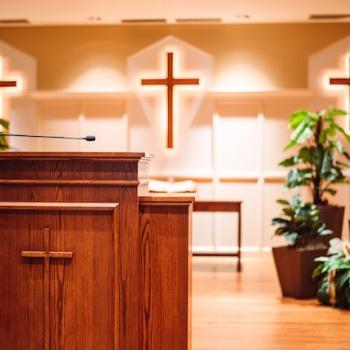Recently I’ve been exploring the question: When we read the Bible, what are we looking for?
One angle is that we’re looking for guidance. Another is that—at our best, at least—we’re looking to avoid authoritarianism.
So if we are looking for guidance, in some form, but we are looking to avoid authoritarianism—what, then, are we really looking for? What kind of guidance? What kind of non-authoritarian values, beliefs, and practices?
I would like to suggest this: When we read the Bible, at our best, we’re looking for love and justice.
Embracing Our Biased-ness, Choosing Our Biases
In a world where the Bible is both inspired and complex, we must come to terms with the reality that we are never free of bias when we read it.
How might we approach the Bible, then, when each one of us does so with our own prejudices and preconceived notions of what we might find?
Instead of fighting our biased-ness and trying to be—or pretending we are—a blank slate for God to write on, perhaps we can embrace the fact that we are limited and biased. Then, where possible, we can choose what kinds of biases we have.
In A Year of Biblical Womanhood, progressive Christian writer Rachel Held Evans reflected on this beautifully. She asked this: “Are we reading [the Bible] with the prejudice of love or are we reading with the prejudices of judgment and power, self-interest and greed?”
I love this idea of a “prejudice of love.” If I am unable to be unprejudiced, perhaps I can learn to embody a prejudice toward love.
I am human, and I will never be free from error. But maybe I have some say over what kinds of errors I will be most likely to make. Perhaps I have some agency in determining which prejudices I would like to have.
Like Held Evans, I would very much like to err on the side of love.
Finding the Balm
I also think of these words from Rachel Held Evans, found in the same passage of A Year of Biblical Womanhood: “If you want to do violence in this world, you will always find the weapons. If you want to heal, you will always find the balm.”
The Bible contains both. Weapons and balm. And so, as we read the Bible, we find the need to ask ourselves these kinds of questions:
- In a world full of violence, what kind of role will we have? What kind of people will we be? What do we want?
- Where do we come to the Bible looking for weapons? What would it look like to put those weapons down?
- Where do we come to the Bible looking for balm—for ourselves, others, and our world?
- What does it look like to look for peace?
In the Christmas season, Christians remember and celebrate the words of the angels who appeared to the shepherds, saying, Glory to God and peace on Earth.

Not just at Christmas, but all year round, we can read the Bible asking: Where is peace? How can these texts inspire us to make peace? What does peace look like? What are the things that make for peace, and how do we pursue these things wholeheartedly?
When I read the Bible, I want to be among those who come looking for peace. For love. For justice. For equity. I want to be among those who, in Held Evans’ words, “want to heal”—and those who “find the balm.”
Looking for God’s Invitations Toward Love and Justice
Maybe just as much as the Bible is meant to guide us, it is also meant to reveal us to ourselves. The way we respond to a particular story says so much. We learn from what we find in our hearts and minds as we read.
And we learn as we read with others in community. As we share our honest responses to the texts and listen well to one another.
When we read a biblical story together, someone else might have a totally different reaction from my own. She might relate to a different character in the story. He might take as second nature something I feel challenged by. They might notice and remember a detail I overlooked.
All this helps us know one another better, and it helps us know ourselves better. And, somewhere in this discovery, I believe God speaks. I believe God calls—God invites.
Not in an authoritarian, do what I say without thinking too much, kind of way. But in a there’s a better way, and I’d love for you to walk in it, kind of way. In a there’s more to life than this kind of way.
In a hopeful, healing kind of way. A way marked by love and justice.
We can look to the Bible for guidance on the things it clearly wants to guide—things like sharing resources, welcoming the stranger, re-distributing so that everyone has enough. And we can avoid the authoritarian teachings of those who want us to think that whatever they say carries weight and power because it’s supposedly biblical.
And, as we’re looking, we can look for love and justice, healing and hope. We can let the Bible read us as much as we read the Bible.
To me, this is how scripture is interesting, how it’s engaging and worth reading. It’s a conversation partner, a conversation opener. And it’s an opening to a new kind of community.












